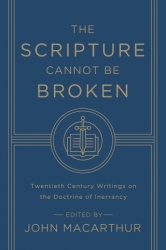Why would John MacArthur bring together in one book a collection of essays on Inspiration and Inerrancy by theologians such as B.B. Warfield, Harold Lindsell, J. Barton Payne, John Murray, J.I. Packer, John Frame, E.J. Young, R. Laird Harris, and Alan Stibbs? It’s pretty clear: at the very least he has provided a first-class textbook for any course on the doctrine. It was a great idea and an excellent resource, and today John MacArthur talks to us about his new book and this foundationally important subject.
Books At a Glance (Fred Zaspel):
In the Introduction to your book you emphasize what a long view of church history has to tell us about the doctrine of church history. Can you summarize your point here for us?
MacArthur:
 It’s clear throughout church history that the people of God have always regarded the Bible as absolutely true, reliable, and authoritative. Real and lasting consensus in the church comes when Christians agree with Scripture; division always occurs when one side or the other appeals to a different authority—whether it’s papal infallibility, current scientific theory, private revelations, or whatever. So one of the most important lessons we learn from church history is that true Christian unity must be grounded in the truth of Scripture.
It’s clear throughout church history that the people of God have always regarded the Bible as absolutely true, reliable, and authoritative. Real and lasting consensus in the church comes when Christians agree with Scripture; division always occurs when one side or the other appeals to a different authority—whether it’s papal infallibility, current scientific theory, private revelations, or whatever. So one of the most important lessons we learn from church history is that true Christian unity must be grounded in the truth of Scripture.
A corresponding lesson is that when any church or Christian institution begins to doubt the authority or inerrancy of Scripture, the inevitable result is spiritual decline and utter apostasy.
We put this book together to show that the current attacks on Scripture are by no means new. The questions being raised about the Bible’s reliability are all variations on the same old, already-answered arguments our spiritual ancestors dealt with. And these essays and articles are wonderfully edifying works that deserve to be kept in print.
Books at a Glance:
Especially for our younger readers, comment for us on the significance of the International Council on Biblical Inerrancy and its 1978 Statement.
MacArthur:
I was privileged to be part of the International Council on Biblical Inerrancy from its start in 1978 until the organization completed its work and formally dissolved in 1987. At its inception, the founders of ICBI commissioned a series of written documents that answered every significant argument that was floating around attacking the reliability or accuracy of Scripture. Over the next decade, they sponsored three summit meetings that brought together some 300 evangelical scholars to explain the issues and defend inerrancy. They sponsored two major national conventions, open to anyone, where these issues were publicly aired and definitively answered. They also worked with publishers to produce dozens of books across the full range of readership from simple lay level to the highest echelons of scholarship, all defending the authority, sufficiency, and inerrancy of Scripture.
But the most important thing they did occurred at the very outset, in 1978. They produced a theological statement that stands today as the clearest, most complete confessional statement on the inspiration and authority of Scripture ever produced in the history of the church—the Chicago Statement on Biblical Inerrancy.
The Chicago Statement stands as the most significant and far-sighted confessional statement of the twentieth century—including the Lausanne Covenant of 1974, which quietly sidesteps the issues of biblical authority and infallibility.
I fear there are people in positions of leadership in the broad evangelical movement today who would like to forget the Chicago Statement—who would not wish to sign it—because frankly it is impossible to hold to biblical inerrancy consistently and bow to the conventions of twenty-first century political correctness on the great moral issues at the heart of public discourse today.
Books at a Glance:
Our generation has seen many evangelicals turn away from – or, at least water down – the doctrine of inerrancy. In your judgment, what factors lie behind this move away?
MacArthur:
Because our culture has drifted so far from every biblical standard of righteousness, there is simply no way to maintain that the Scriptures are true and remain comfortably in step with the spirit of the age. And that’s a significant problem for certain trend-setters in the church and in the world of evangelical academia who are obsessed with winning the world’s applause.
In fact, a craving for academic respectability or worldly popularity in a culture like ours is absolutely destructive to faith in the Word of God. If a person is unwilling to take a stand against popular opinion or whatever moral standard, political fad, or scientific theory is currently in vogue, then any biblical convictions that person might have begun with will soon crumble.
Books at a Glance:
Do you think the ICBI statement needs updating yet? Does it still speak sufficiently to our generation and its specific objections?
MacArthur:
It’s remarkable how thoroughly the Statement answers the common objections to inerrancy that are in circulation today. None of the arguments that are being used against biblical inerrancy are really new. So I don’t see any urgent need to alter the Chicago Statement—and certainly not in any way that softens or diminishes it. I’d be loath to open up that possibility, because my fear would be that such a process would take the teeth out of it. There may be cause to strengthen it by adding some things that address current assaults on inerrancy.
Books at a Glance:
It’s not uncommon to find that in schools that affirm the fundamental importance of inerrancy the doctrine is not given a correspondingly prominent role in the curriculum or in the classroom instruction. I suspect that is not the case at The Master’s Seminary. Can you give us a sense of the place this doctrine is given in the training of students at TMS? In terms of equipping, and not just emphasis, what can a prospective student expect on this score?
MacArthur:
The foundation of everything we do is the truthfulness, inerrancy, authority, and perspicuity of Scripture. We are producing expositors of Scripture—preachers who explain the meaning of the Word of God. And we are building into them the confidence that every word is pure and all Scripture is inspired. Simply stated, everything we do is built on the foundation of an inerrant and authoritative text. We stress this in every course, at every level.
Books at a Glance:
Tell us about your new book, Scripture Cannot Be Broken, and the essays you have selected.
MacArthur:
We picked out a representative group of hard-to-find but important essays in defense of biblical inerrancy. These are works that should not be forgotten or allowed to fall into obscurity. And we undertook this project with the hope of demonstrating to Christians who have little knowledge of how these matters were debated in the past that the current wave of skepticism is nothing new, and not particularly compelling. What’s different in this generation are the high levels of indifference, confusion, and timidity that have all but silenced those who call themselves evangelicals today. So our goals in this book are to reintroduce the issue of inerrancy, show its importance, and give our fellow believers a model to follow and an exhortation to speak out in defense of the truth of Scripture.
Books at a Glance:
What brought this book about? And what are your objectives in bringing it together?
MacArthur:
Most mainstream evangelical leaders today would not necessarily argue against inerrancy, but they have not shown a willingness to defend it. This is an age of pragmatism and “seeker sensitivity.” Theological controversies spoil the comfortable atmosphere most young pastors think is necessary for church growth. A lax attitude toward biblical inerrancy is further aided and abetted by loose English translations—far-fetched paraphrases like The Message, which assaults the very idea of verbal inspiration by playing fast and loose with the words of Scripture. All those things, plus postmodernism’s general skepticism toward truth-claims of any kind, have fostered a dangerous disinterest in biblical inerrancy. The enemies of truth are taking advantage of that.
It is important for us to reach back and understand how the Holy Spirit has illuminated the people of God through the ages and correctly comprehend what they believed and what they fought for. So we wanted to take readers back where they could listen to faithful men who confronted attacks on Scripture—to learn from them, reclaim the rich insights they had, and employ their stellar defense of biblical truth for the benefit of our generation.
Today’s culture is often characterized by a willful ignorance of history. Perhaps it is not too strong to say the popular perspective today is that the past is mostly just something to be shunned, ashamed of—held in contempt. Even in the church, everything needs to be new, stylish, cool, hip, and contemporary. Church growth, ministry philosophy, and worship styles are to a very large degree driven by an attitude of proud isolation from the past. Contemporary evangelicals don’t want the theology of the past, the customs of the past, or the great hymns of the past—and they don’t seem to want to listen to the wisdom of past generations.
We need to understand that we are part of a long history. The church of Jesus Christ is one, across the generations. The faith we confess isn’t supposed to change with the generations. It is (in the words of Jude 3) “the faith which was once for all handed down to the saints.” It’s cannot be remodeled to suit each successive generation.
Furthermore, God has always raised up key leaders in every age to stand against the assaults on His Word. We need to take our stand in this generation with those who were faithful in previous generations.
Books at a Glance:
The inspiration and inerrancy of Scripture has been one of the hallmarks of your ministry. Summarize for us the value of this doctrine both for the preacher and every Christian.
MacArthur:
We don’t have a ministry unless we have an inerrant text. If there are errors in the Bible, then by what criteria do we determine what is true? We’re left to ourselves. We are hopeless. We’re at sea without a compass. So obviously if you are going to have a ministry that represents the truth of God, you have to know that you have His Word, that it is absolutely true and reliable, and that we believe it. Otherwise, you are freewheeling your way along, inventing whatever you want.
In other words, the inerrancy of God’s Word is ultimately the foundation of all true ministry.
Buy the books

SCRIPTURE CANNOT BE BROKEN: TWENTIETH CENTURY WRITINGS ON THE DOCTRINE OF INERRANCY
